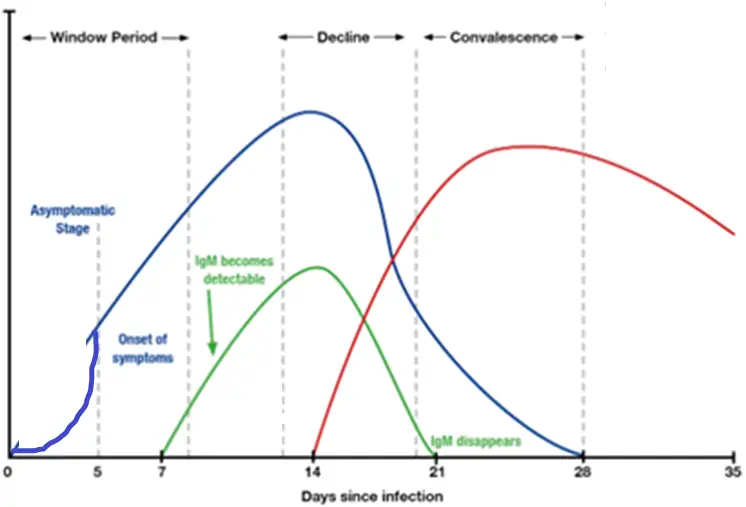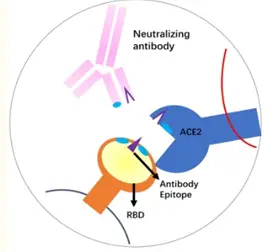
Will You Need an “Immunity Certificate” for Covid-19?
FiPhysician
Scarlet “C” – Serology and Immunity Certificates
In a month or so a Scarlet “C” might be your most valuable accoutrement. This wearable “immunity certificate” for Covid-19 means immunity to the pandemic virus.
Wear your Scarlet “C” with pride! With it, you can go out in public without fear. You can care for those with Covid-19 in hospitals and visit the vulnerable in nursing homes. Travel anyone? Oh, what wonders you can do with a Scarlet “C”!
Let’s look at what we know about IgG antibody testing—serology—and try to decern if past exposure to Covid-19 means immune to Covid-19. The hope is exposure to Covid-19 provides current immunity to re-infection.
Is a serological test or an immunity certificate in your future?
Table of Contents
Primer on Serology and Immunity to Covid-19
First, let’s look at the expected immune response to a challenge with the virus that causes Covid-19.

Figure 1 (Immune Response to Covid-19)
Figure 1 shows the expected immune response to SARS-CoV-2, the virus that causes Covid-19.
Note that days since infection is along the bottom. You are exposed at day 0. The blue line is the viral RNA detectable in your nose. I had to correct the blue line in the graph that I pilfered online, so I apologize that my line isn’t perfect. It does, however, provide me the opportunity to make point.
From day 0 through day 3 or 4 you are not contagious to other people. Then on day 3-5, the amount detectable in your nose increases exponentially and you are contagious. You can be asymptomatic with Covid-19, or pre-symptomatic and yet contagious to other people.
Onset of symptoms in the figure above is day 5. The graph shows the viral RNA slowly increasing from there until you mount an IgM response. The IgM response (in green) is temporary, but blunts the infection. IgM goes away about 21 days after exposure.
Red represents IgG and immunity. After your immune system processes the SARS-CoV-2 antigens, it can “switch” from IgM production to IgG production. IgG antibodies are then able to eradicate the viral RNA from your system and provide ongoing immunity.
So, in summary, initially you make IgM antibodies from day 7-21 after exposure. Then, you have long(er) lived immunity with IgG antibodies which begin around day 14 after exposure. As of yet, it is unclear how long the IgG antibodies stay in your system and protect you from future infection.
What about serology? Can we test your blood for IgM and IgG against SARS-CoV-2?
Serology for Covid-19- Don’t Use the Early Tests!
A word of caution. Very early in this outbreak there were “tests” made in China that have been confusing consumers and doctors alike. Often these are finger prick “card” or rapid tests that you can buy on line or from your local snake oil clinic for $35. The problem with these cards is that they detect ANY coronavirus, not just the Covid-19 coronavirus.
They have a multitude of issues including:
-false positive IgM which may make you think you are infected when you are not
-delay in true positive IgM which means you could be infected but the test isn’t positive yet
-positive IgG due to exposure to one of the endemic (non-Covid) coronaviridae.
As a reminder, there are at least 4 other species of coronavirus that cause common colds in humans. If you got one of these in the last couple years, your IgG on these tests could be positive and you would think you were immune to Covid-19—but you are not!
Some problems are specific to these crappy tests, and some are problems with serology in general. The specific issue: you can’t tell which type of coronaviridae to which you have immunity, so it really isn’t useful EVER. Don’t buy a $35 online test for Covid-19!
The other problems are serology-in-general problems, so let’s look at those issues next.
The Problems with Serology for Covid-19
So, to be specific, the industry is working on a blood test (could be finger stick) that detects IgG specific to SARS-CoV-19. This test does not have cross reactivity to the other coronaviridae. It proves you have detectable levels of IgG antibody against SARS-CoV-2.
Likely, IgM testing won’t be important. As you see in Figure 1, you can be contagious with Covid-19 long before you have an IgM response. PCR testing is more valuable for acute diagnosis. Additionally, IgM is fraught with false positives as well. These false positive cause headaches for ID docs helping out our colleagues who not infrequently order the wrong tests.
Serology tests may include IgA levels. IgA usually indicates mucosal immunity. In this setting, it is helpful to confirm the IgG is “real.” It is also interesting to consider that there are ACE receptors in the GI tract and you can find SARS-CoV-2 in the stool. I hope someone is at least considering oral live-attenuated vaccines for Covid-19. That’s, however, more than we need to know for our current purposes.
The main issue with serology for Covid-19: we are not yet sure which of the antibody to measure. There are multiple viral “targets” for the immune system. Which antibodies are neutralizing antibodies and prevent future infections? What is the cut off for immunity and how long does it last? Will the virus mutate and some IgGs will no longer be protective?
Many biotech firms are rushing these tests out into the market. In fact, IgG serology for Covid-19 is already relatively common in research labs. During this public health emergency, we will test first and figure out the implications as we go.
Expect to see many headlines about serology in the next few weeks.
Headlines to Pay Attention to Regarding Covid-19 Serology
You will see the exponential growth of headlines concerning serology soon. People will want their immunity certificate and Scarlet C!
A google search today turned up a 3% background positive rate in a small town in Colorado, a 13% positive rate in a German town with a ton of infections, and much more.
There are two types of headlines to which you might want to pay attention:
Background Serology or sero-prevalence surveys look at a large number of random people in different communities. For instance, what is the background immunity rate in NYC vs your home town? This is important as the lower the immunity rate, the worse the second and future waves will be.
Serology in “at-risk” individuals. It will be very interesting to see the rates in our first responders, our grocery and other essential workers, and our healthcare workers. These are folks who were more exposed to the first wave of Covid-19, and will remain at risk in the future.
Essentially, what we are looking for: the number of asymptomatic cases in the general population and in the at-risk population. There is no reason to think that asymptomatic or mildly symptomatic cases should not provide long-lived immunity too. So, the longer Covid-19 is churning in the background in your community before it took off and affected the hospitals, the better off your community will be.
It will also be interesting to see sero-prevelence studies in children and the elderly. Do our children just not get this disease (they don’t have the receptors, or have some other physiological difference than adults), or do they just not have symptoms? And for our elderly, will they need to continue social distancing for 2 or more years while we try to find a vaccine that works with their often-incompetent immune system?
When Will Serological Testing Be Available?
Test are available now for research purposes. In a week or so, I bet your physician will be able to order tests that go out to reference labs. This might be useful for our medical and first responders, but we might not know what to do with that information for a while.
In a month or so, your local hospital will be able to run these tests routinely in their labs.
Hopefully also in a month or so, we will have point of care testing. These rapid tests, or cards, will allow you to take a fingerpick of blood and put it on a card and know within minutes if you have antibodies.
When Immunity Certificates will be available will depend on what the CDC and federal government decide to do with the process.
Other Issues in Serology and Immunity to Covid-19
Let’s look at some fun miscellaneous issues:
Re-infection Concerns
It seems likely that re-infections you hear about are due to false negative PCR results. That is, someone tests negative but then tests positive again a few days later. The hope is once you have Covid-19, you have immunity for at least a while, but this is still being worked out, especially in those with prolonged illness. Prolonged illness (vent use for 2-3 weeks) may be due to ARDS and cytockine storm issues rather than prolonged viral infection but we need more information.
False Negative PCRs
And a question that I don’t see an answer to—why are there so many false negative PCR tests? The problem with PCRs in general is that they are too sensitive… they pick up very low levels of virus and even dead virus. Why are we having so many false positive PCRs? Is it because the virus is only intermittently in the nose? Or because the site of infection is the lung and we are sampling from the nose? This is not an insignificant issue right now, but I don’t see that anyone has a good answer yet.
How Long Does Immunity Last?
For the endemic betacoronaviridae, immunity last only 6-12 months but some SARS survivors have neutralizing antibodies 17 years later.
Monoclonal Antibodies as Treatment
So called “mabs.”
If you have cancer, you might be getting one of these unpronounceable drugs. They all end in mab which is short for Monoclonal AntiBody.
They used to be humanized mouse antibodies but to be honest, I have no clue what they are anymore. Expect I know they are really expensive.
Since they are really expensive you can be sure the leaches at drug companies are pouring their hearts and souls into making them rather than researching generic medicines that have a chance to work against Covid-19. Pharmaceutical companies might be doing their part during this pandemic, but they have a history of only caring about money not patients.
Passive Immunity and Treatment of Covid-19
Currently, treatment protocols are giving serum from folks that have recovered from Covid-19 to those who are ill. Will this work to prevent infections? Will it just treat early infections, or will it help those dying in the ICU?
Do Your Research if You Take a Test
Where you can find information on line about a tests looking for regulatory approval.
How Do Neutralizing Antibodies Work?

Figure 2 (How Neutralizing Antibodies work against Covid-19)
And finally, for those of you who are interested, this is how neutralizing antibodies work against Covid-19. From here, figure 2 shows a neutralizing antibody with a “lock and key” arm against the antibody epitope (the area of the virus that the antibody attaches to). This prevents the Receptor Binding Domain of the virus from binding to the ACE2 receptor on your cells, thus preventing internalization into your cells and infection.
Something to ponder: the receptors on your respiratory mucosa are “outside” your body where your mucosa interacts with the air. IgG antibodies live “inside” your body, in your blood and intestinal space. Bonus points to anyone who can tell me in the comments below how inside proteins protect your outside spaces.
What Does the Future Hold-Immunity Certificates
For our first responders, essential employees and healthcare workers, expect to see the Scarlet “C” on name badges. These folks will likely be able to care for Covid-19 cases without PPE. Research in Monkeys show that you are protected after exposure to Covid-19. Time will tell if this is the case for humans.
For travel, expect your passport to have a page with an “immunity certificate.” This means you can travel in the US and perhaps worldwide without additional screening.
Perhaps the re-birth of the cruise industry will be “immunity cruses?”
Using the Scarlet “C” and Immunity Certificates
Immunity passports or Immunity certificates are already been discussed.
Today, I am adding Scarlet “C” to the internet lexicon. My guess is you will see name ID tags with specific markings within a month at most hospital around the country.
Rather than a marker of perceived sexual transgressions, a Scarlet “C” will indicate a small step in ridding our world of the Covid-19 pandemic.
___
https://www.fiphysician.com/immunity-certificate-for-covid-19/
